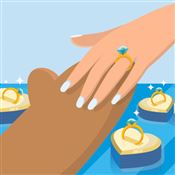Study: Average Engagement Ring Cost
Men spend an average of $5,225 on an engagement ring. Surprisingly, most women think it's too much. See what this study revealed.
 |
If you're shopping for an engagement ring, you're probably wondering how much other couples spend. See below what others are doing. And get some insight into the most important factors.
Average Engagement Ring Costs
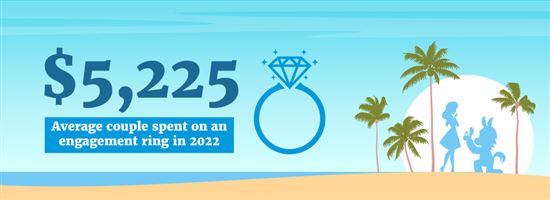 |
The average couple spent $5,225 on an engagement ring in 2022. Breaking it down, 19% spent less than $1,000. Twenty-nine percent of couples spent between $2,000 and $5,000, while 9% spent over $10,000.
This is down from the 2016 average of $6,163, and the 2019 average of $7,750.
This is not to say you must spend over $5,000 on an engagement ring. You should only spend what you can afford. Consider your income, expenses, savings, and future goals (like buying a house).
Ideally, you don't want to finance the ring. But, that's a personal decision. It's best to discuss the options with your partner to come up with a budget that works for both of you and your plans.
You may be surprised to learn what your partner thinks.
Men and Women Opinions on Budget
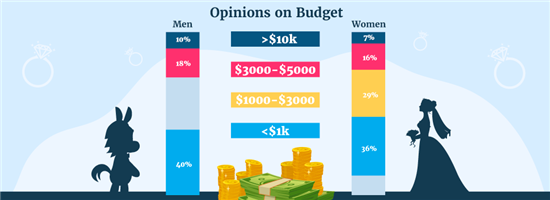 |
Over eighty percent of Americans think the engagement ring shouldn't cost over $5,000, which is less than the average spend. This is why it may be a good idea to discuss the budget together.
Believe it or not, women are more frugal when it comes to spending on an engagement ring.
Thirty-six percent of women think an engagement ring should cost under $1,000. Twenty-nine percent say between $1,000 - $3,000. Sixteen percent think between $3,000 - $5,000. And only 7% think it should cost over $10,000.
Approximately 4% of brides help pick up the tab for their own engagement ring. But still, 94% of proposers buy the ring all on their own. Three percent get some help from parents.
For the most part, men's opinions align with women's.
Forty percent of men think $1,000 or less is a good amount to spend on a ring. Eighteen percent prefer to spend between $3,000 and $5,000. Surprisingly, 10% would spend more than $10,000 on an engagement ring.
About 18% of brides offer their input, but let the groom make his own final decision. Nine percent of couples decide on the budget together. Since getting married means joining finances, it makes sense for the bride to also have a say.
The Center Stone Preferences
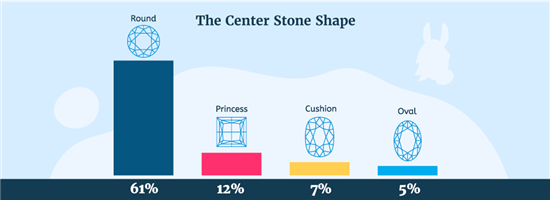 |
The average carat weight for the center diamond is 1.08 - 1.2 carat. The average size differs by region. In Los Angeles, the average size is 0.83 carat, while it's 1.45 carat in New York City.
But don't choose the ring based on the size of the diamond. You should buy what you can afford.
It's often assumed by society that women want large diamonds, but that's not true. Only 14% of women say that the size matters, while 86% say the quality of the diamond is more important. In comparison, 20% of men think size is more important.
Fifty-four percent of women say the most important factor is the style of the ring. Even a large diamond would be a disappointment if the ring itself isn't to her taste.
Eighty-two percent of people choose a diamond for the center stone. Sapphire and emerald are the next popular choices, with 4% each. About 8% of people opt for something else, such as moissanite or another semi-precious gemstone.
Sixty-one percent of brides choose a round diamond for the main stone. It's timeless and classic, after all. Princess ranked second with 12% of brides rocking these shapes. After that, cushion (7%) and oval (5%) are the next most popular shapes.
Lab created diamonds are gaining in popularity because they're budget- and eco-friendly. Forty-seven percent of women don't care if the diamond was made in a lab.
Lab diamonds cost significantly less than natural diamonds. A good value 1-carat lab diamond costs around $1,800, while the same quality earth mined diamond would cost $5,000.
Amazingly, 40% of people think a fake diamond is fine. Even more astonishing, women care less than men. About 44% of women don't mind a fake ring, compared to only 35% of men.
Where People Are Buying Rings
Most people still want to see their ring in person. Thirty-one percent of couples bought the engagement ring at a national chain jeweler (like Kay, Zales, and Jared). About 28% went to an independent local jeweler, and 11% shopped online.
On average, proposers visit 3 retailers and look at 15 rings before making their final decision.
Of those who bought their engagement rings online, Brilliant Earth - famous for being the ethical jeweler - was most popular, with 22% of couples making the purchase there. After that, it's Blue Nile (16%) and James Allen (16%).
Buying an engagement ring online could save you as much as 40% over traditional big box jewelry stores. The online shopping experience has really improved nowadays and it's perfectly safe to buy a ring online.
Engagement Details
Some women love surprises. Others hate them. More women prefer not to be surprised, though.
About 56% of couples discussed or chose the ring together, while 9.4% even bought the engagement ring together. Only 35% of men bought the ring completely on their own as a surprise.
Contrary to popular belief, it's not the women rushing the men down the aisle.
Men prefer a shorter engagement period. Thirty-eight percent of men think 6-12 months is plenty long to wait for the wedding. Only 12% preferred an engagement lasting longer than 2 years.
Women prefer to spend more time engaged. Maybe it's to plan their dream wedding. Maybe they just want to enjoy time together without the pressure of marriage. Forty-two percent of women prefer to remain engaged for 12-18 months before their big day.
Wedding Ring Costs
 |
The average man's wedding band costs around $510. But the price could vary from under $50 to $2,000, depending on the metal.
Titanium is the least expensive and platinum is the most costly. Some men add a few small diamonds to their wedding ring too, making it more expensive.
Women tend to spend a bit more, averaging $1,100 for their wedding ring. Many women prefer diamonds on their bands. This could be the reason.
Traditionally, the groom buys the bride's wedding ring, and she buys his. But many modern-day couples, buy the rings together out of a joint wedding fund. Most likely, since your finances will merge soon anyway, you both pay for them.
Saving Money on the Engagement Ring
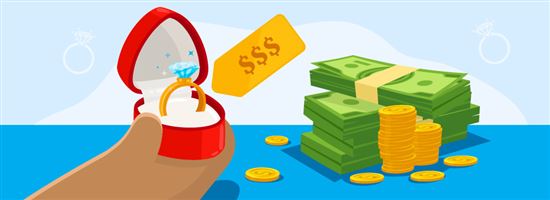 |
Finally, here are some tips to get the most out of your budget when shopping for an engagement ring.
Look for an Under-Sized Diamond
There's something impressive about saying you bought a 1-carat diamond. But your wallet might disagree. Half and whole carats (0.5, 1, 1.5, etc.) have a huge jump in price.
You can save 20% by going with a 0.9-carat diamond instead. The actual size difference is so small, you can't even tell.
Get an Ideal Cut
Out of the 4 C's—cut, clarity, carat, and color—cut is the most important. A diamond that's ideally cut will sparkle more and look bigger. The sparkle can hide flaws and mask color, so you can save on those areas.
Don't Get Too Caught Up on Quality
The diamond color and clarity are not as important as you think. These are features you usually can't see with the naked eye, so there's no need to buy a top-quality diamond.
Go for an Alternative Shape
Forty-seven percent of people choose a round diamond. Because it's the most popular shape, it's in the highest demand and also the most expensive. If you choose another shape (like princess, oval, cushion, emerald), you can save as much as 40%.
Consider a Lab Diamond
Lab created diamonds cost a lot less. So for your same budget, you can buy a much larger stone. Or you can put the savings towards a nicer setting.
Maximize with a Good Setting
If you can only afford a small diamond, you can still make it look larger with certain settings. The trendy halo setting has a ring of small diamonds around the center stone. It can make the diamond look huge.
Bottom Line
Buy what you feel is right. You don't have to keep up with the Jones'. You will know which ring is right when you see it. Involve your sweetie in the decision and you're sure to make the right choice.
Sources and References:
Write to Kim P at feedback@creditdonkey.com. Follow us on Twitter and Facebook for our latest posts.
Note: This website is made possible through financial relationships with some of the products and services mentioned on this site. We may receive compensation if you shop through links in our content. You do not have to use our links, but you help support CreditDonkey if you do.
|
|
| ||||||
|
|
|
